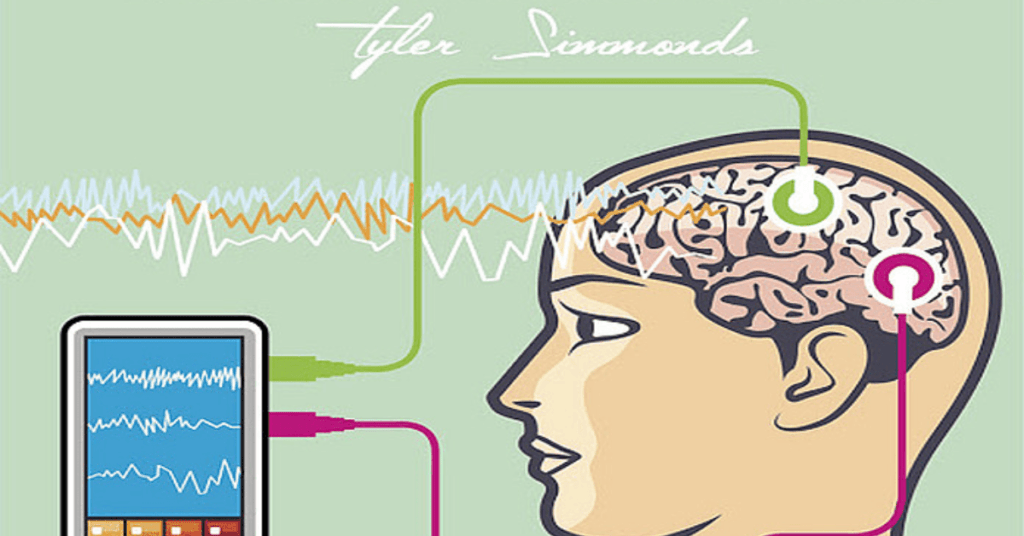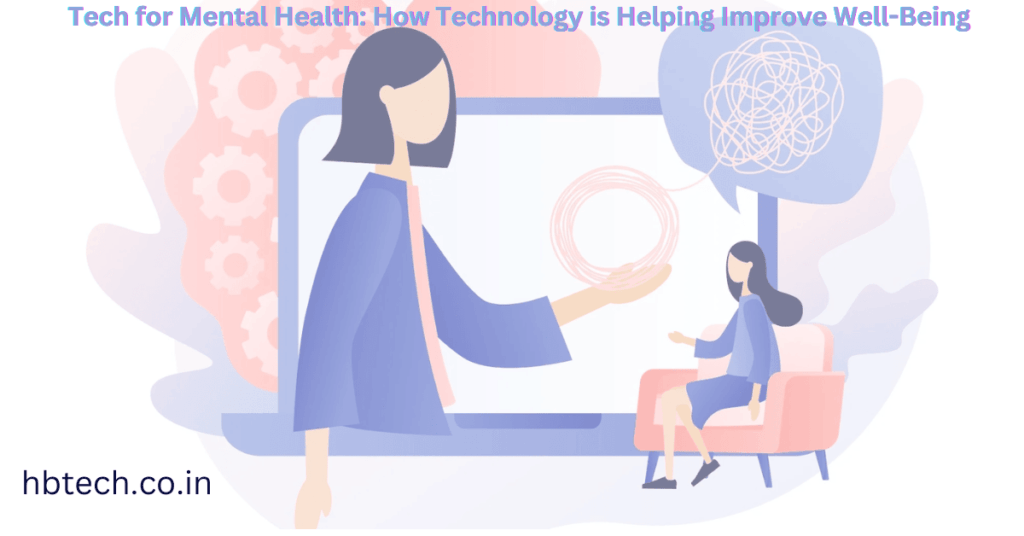Mental health has become a major focus for many people today , especially with the challenges of modern life. As more people become aware of how important mental health is, technology is stepping in to offer new ways to help. From apps that help with stress to virtual therapy, tech is making it easier for people to get the support they need.

In this blog, we ’ll look at how technology is changing the way we care for our mental health and how it’s helping people all over the world.
How Technology is Helping Mental Health
1. Mental Health Apps
Smartphone apps are one of the most popular ways technology is helping with mental health. These apps offer tools to help manage emotions, reduce stress, and even provide therapy. Some popular ones include;
- Headspace and Calm: These apps guide users through relaxation exercises, meditation, and breathing techniques to help reduce stress and promote better sleep.
- Talkspace and BetterHelp: These apps connect people with licensed therapists through text, video, or phone calls, making therapy more accessible for anyone with a smartphone.
- Moodpath and Daylio: These apps let users track their mood and identify patterns in their emotional well-being, helping them understand their feelings better .
These apps are making mental health care more affordable and accessible for people everywhere.
2. Virtual Therapy and Telehealth
Telehealth has become a game-changer in mental health care, especially with the rise of virtual therapy. Teletherapy allows people to meet with therapists from the comfort of their homes, eliminating the need to travel or worry about busy office schedules.
Services like BetterHelp, Talkspace. and 7 Cups let individuals connect with a professional therapist via phone or video call, making it easier for people to get the help they need. This flexibility makes therapy more convenient for people with busy lives or those who live in areas without many mental health professionals.
Some advantages of virtual therapy include:
- More privacy and comfort
- The ability to have therapy anywhere
- Less stigma for people who feel embarrassed about seeking help in person,
3. Virtual Reality (VR) Therapy
Virtual reality is one of the newest and most innovative ways technology is being used in mental health care. VR therapy helps people confront and work through their fears or past trauma in a controlled and safe space.
For example , VR exposure therapy helps treat conditions like PTSD or phobias by immersing patients in virtual environments. If someone is afraid of public speaking, for example , they might practice speaking in front of a virtual audience. This helps them face their fears gradually and with the guidance of a therapist.
4. AI and Chatbots for Support
Another exciting development is the use of AI (artificial intelligence) to provide mental health support. AI chatbots use technology to have conversations with users, offering emotional support and even providing therapy techniques.
Apps like Woebot and Wysa use AI to offer users cognitive-behavioral therapy (CBT) tools, mood tracking, and general emotional support. These chatbots learn over time, offering more personalized advice based on what the user shares. Though they’re not a replacement for in-person therapy, they can be a great resource for people needing a little extra support throughout their day.
5. Online Support Communities
Technology has also made it easier for people to connect with others who understand what they’re going through. Online communities, support groups, and forums offer a space where people can share experiences, ask for advice, and offer support.
Websites like 7 Cups, Reddit, and Mental Health America host communities where people can talk about mental health challenges in a safe and supportive environment. These online spaces help reduce isolation and make it easier for people to find support and encouragement.
Benefits of Using Tech for Mental Health
- Access Anytime, Anywhere: You do n’t have to wait for an appointment or travel to a clinic. With apps and online therapy, you can get help at any time.
- Affordable: Many mental health apps are free or cost much less than traditional therapy sessions, making them more accessible to people on a budget.
- Privacy: For those who feel nervous about speaking to a therapist in person, online tools provide a more private way to get support.
- Convenience: With apps, virtual therapy and AI chatbots, it’s easier than ever to fit mental health care into a busy schedule.
Challenges to Consider
While technology offers many benefits, there are still some challenges to keep in mind;
- Limited Human Connection: While AI and virtual therapy are helpful, they can’t replace the personal connection you get from in-person therapy.
- Privacy Concerns: Mental health apps collect personal data, so it ‘s important to choose platforms that have strong security measures to protect your information.
- Not Everyone Has Access: Not everyone has access to the internet or a smartphone, which can limit the reach of these tech solutions.
Future of Tech for Mental Health
As technology continues to advance, we can expect even more tools to improve mental health care. The future may include:
- More accurate and personalized AI chatbots
- Greater use of VR for different types of therapy
- Better access to mental health resources for underserved communities
- Continued improvements in virtual therapy platforms
With these innovations, technology will play an even bigger role in supporting mental health, helping people live happier, healthier lives.
Technology is transforming the way we approach mental health. With apps, virtual therapy, AI chatbots, and online communities, mental health care is becoming more accessible, affordable, and convenient. While it ’s not a replacement for traditional therapy , tech is a powerful tool that can complement and enhance the support people need.
As technology continues to evolve, it will only improve the ways we care for our mental well-being, making mental health support available to more people around the world.
Frequently Asked Questions(FAQs)
How does technology help with mental health?
Technology helps by providing easy access to mental health support through apps, virtual therapy, AI chatbots, and online support communities. These tools help users manage emotions, reduce stress, and access professional help without leaving home.
What are some popular mental health apps?
Some popular mental health apps include:
Headspace and Calm: For meditation and stress relief.
Talkspace and BetterHelp: For virtual therapy with licensed therapists.
Moodpath and Daylio: For mood tracking and emotional well-being.Can virtual reality (VR) help with mental health?
Yes, VR therapy helps people confront fears, anxieties, and traumas in a controlled environment. For example, VR exposure therapy can assist in treating PTSD and phobias by gradually exposing individuals to their triggers in a safe virtual setting.
What is AI in mental health?
AI (artificial intelligence) in mental health refers to chatbots and programs that use machine learning to offer support, provide therapy techniques, track moods, and give emotional guidance. Apps like Woebot and Wysa use AI to provide cognitive-behavioral therapy (CBT) tools and personal support.
Will technology continue to improve mental health care?
Yes, as technology evolves, we can expect even more advanced tools for mental health care. These may include more personalized AI support, better virtual reality experiences, and wider access to teletherapy, helping even more people maintain their mental well-being.
Related Posts
- 2-in-1 Laptops: Tablets and Laptops in One
- 5G Technology: What It Is, It Works and Impact on Our Lives
- 8K Gaming on a Laptop: Is It Worth It?
- A Simple Guide to Remote Work: Work from Anywhere, Anytime
- A Visit to the Museum of Jurassic Technology
- Affordable AI Solutions for Small Businesses









